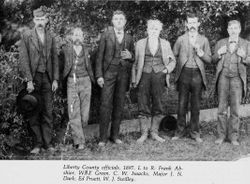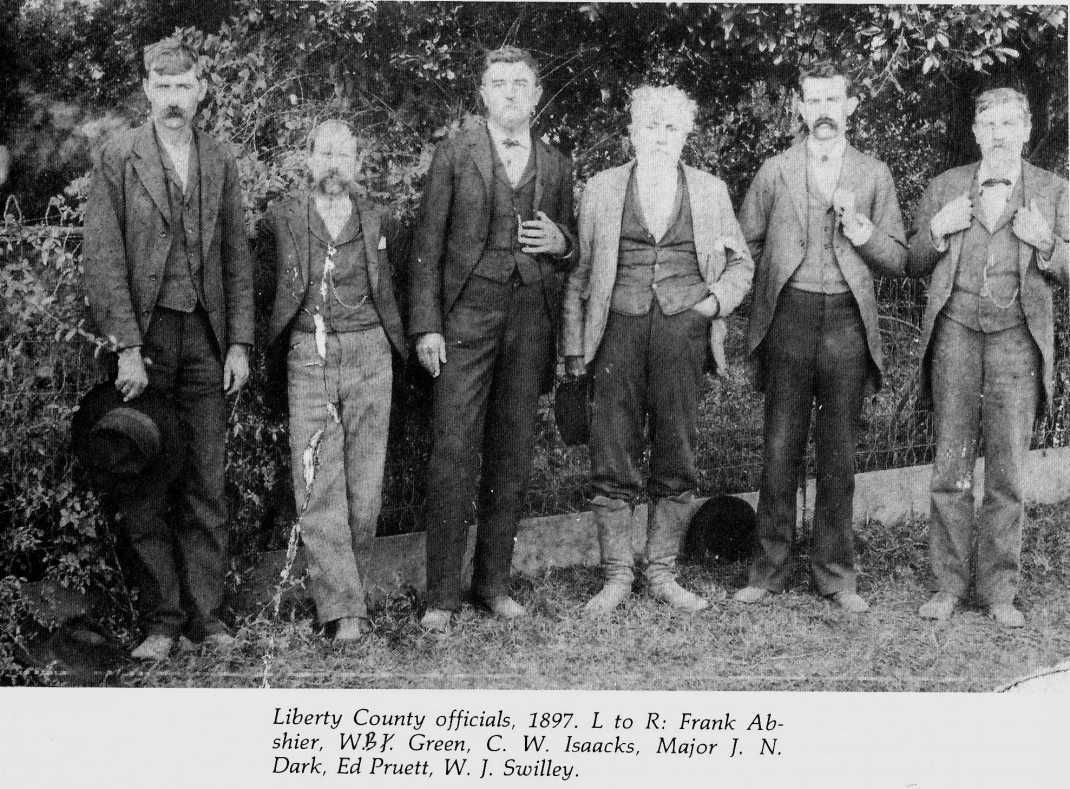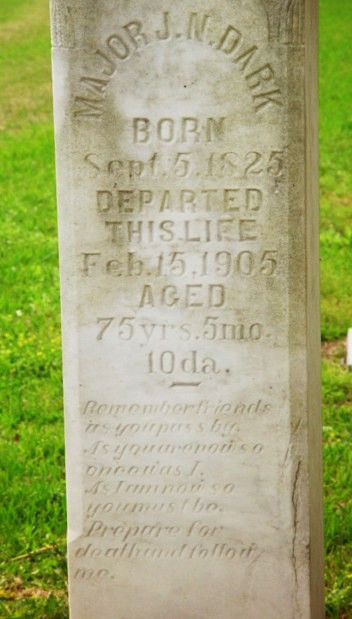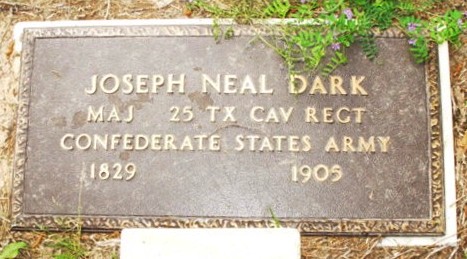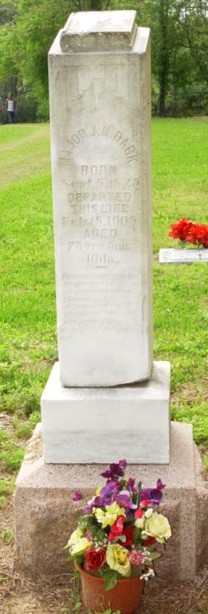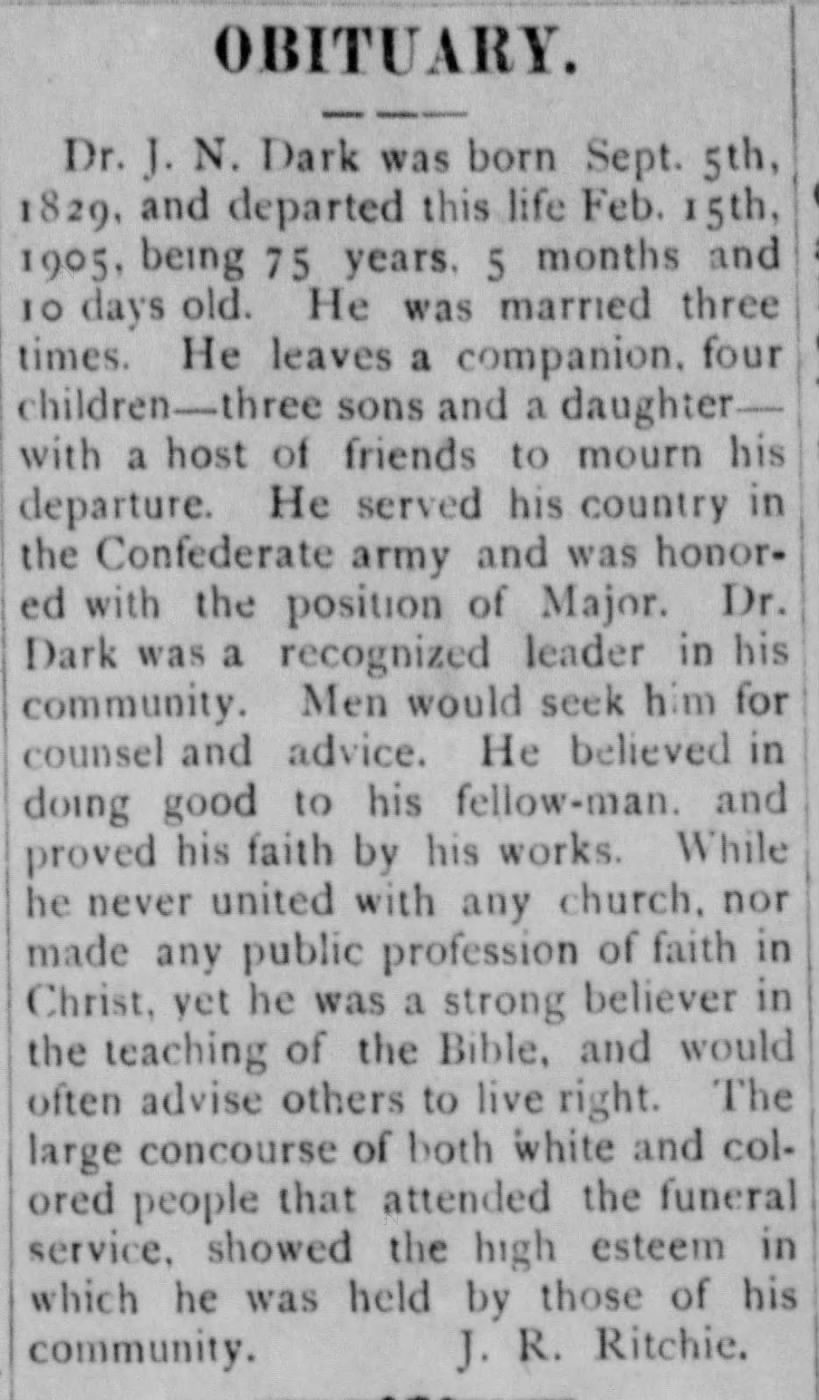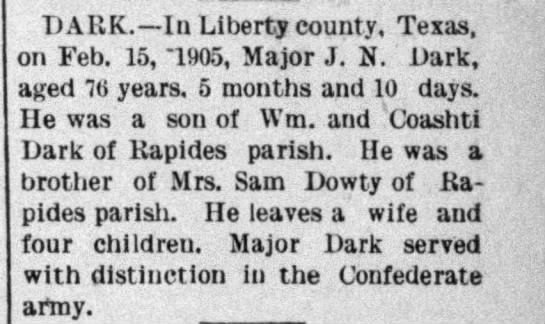Maj. J. N. Dark Dead. After a long and eventful life, Major Joe N. Dark died at his home, near Tanner's Bluff, in this county on the 15th instant, in the 76th year of his life. He had been in poor health for some time, but his wonderful energy and vitality kept him up and attending to business until about two weeks before his death, when he was in town and seemed apprehensive of his approaching end; for, in bidding friends goodby as he was leaving for home, he reminded them that he never expected to make another trip to the "old city" of Liberty. Deceased was born, we believe, in Calcasieu parish, La. His father died when he was quite young, leaving a large estate in slaves and plantations to be controlled and managed by the widow and son, Joe. A part of his early manhood was spent as captain and pilot of steamboats plying between New Orleans and Alexandria, La. Early in the fifties he came to Texas from Louisiana and settled in Hardin county, where he lived for a number of years. He was among the first of those who volunteered in defense of the South, at the beginning of the war between the North and South; raised a company of cavalry, was elected captain, and at the organization of the 25th Texas regiment he was unanimously elected Major, in which station he served through the war, and the Confederacy had no more gallant nor braver officer than Joe Dark. He was beloved by the rank and file of the army and was ever the friend of the private soldier and the defender of their rights. Some years after the war, deceased took up his residence in this county, locating upon a farm about 20 miles north of Liberty, where he continued to reside until the end. He was for a number of years county surveyor of Liberty county, and was regarded as a most competent and efficient officer. He was also a practitioner of medicine and among the poor and needy of both the counties of Liberty and Hardin, he did considerable practice, and by these people he will be sadly missed. Deceased was genial and sociable, kind, sympathetic and helpful; a good neighbor, generous and sincere in his friendship, and for the widow and orphan he was ever ready and willing with wise counsel and an helping hand. Peace to his ashes!.
Fort Worth Star-Telegram, Fort Worth, TX, 26 Mar 1995, Sun, pgs 507-8. Confederate major's grave moved to Higher Ground, by Cindy Horswell, Houston Chronical. Moss Hill:
Maj. Joseph N Dark was buried in full Confederate uniform with a double-barreled shotgun by his side in north Liberty County nearly a century ago. When his remains were recently unearthed, a remnant of his gray uniform with a leather buckle was found, as were the rusty barrels, shrimp claw hammers and frame of the stock from the 54-inch weapon. The shotgun is the same on Dark used to shoot an angry bear – whose orphaned cubs he trained to plow, carry corn and do other chores. It is also the gun he used to kill a would-be robber who participated in an infamous attack on Dark's family.
But Liberty County Historical Commission officials did not disturb the major's grave simply to locate such artifacts. They moved the grave, which had been in an isolated clearing in a cedar grove on County Clerk Wanda Barker's homestead, to save it from encroaching river waters. The Trinity River, which formerly flowed a half-mile from site, has steadily gnawed into the riverbank because of record flooding during the past five years. The muddy currents were within 5 feet of the grave, threatening to claim it in the next heavy rain.
Historical commission members say visitors regularly came to the grave. A pithy epitaph on the 4-foot stone grave marker reminds: "As you are now so once was I, As I am now so you must be, Prepare for death and follow me."
Among descendants who agreed to the exhumation was Dark's great-great-granddaughter, O. D. Allen from Liberty, who attended the unearthing. "You could almost see his entire uniform when they got down to it. The dyed fabric had stained the dirt and left an imprint, which turned to powder when it was toughed," Allen said. Deer Park homemaker Mary Dark, 50, called the major "one of the unsung heroes of Southeast Texas history." Her husband, Stephen, is the major's great-great-grandson.
Maj. Dark, who lived from 1829 to 1905, was a steamboat pilot on the Trinity River, forming one of the area's first companies to fight for the Confederacy. He also was a county surveyor who charted the countryside for a decade, and, as one of the area's first doctors, battled several fever epidemics.
Besides the shotgun and uniform scrap, weathered bones were recovered as well as unusual pewter decorations from the coffin, said J. R. "Jay Tankersley II, director of Sterling Funeral Home in Dayton. He was in charge of moving the remains. Tankersley said the bones indicate that Dark was unusually tall, 6-foot-6. "Out of all the exhumations that I've done on old graves like this, I've never found this much left before," he said. "His casket was very ornate for the period and had a large glass window in the top of it. A pewter Calla lily and anchor that decorated it are considered art objects today, he said. In the major's will, he requested burial in his uniform with his shotgun. All relics taken from the grave were to be reburied with him in a concrete box in Moss Bluff Community Cemetery, Tankersley said.
A search was also made for the remains of the major's second son, Thomas, who died at age 3, and for his second wife, Miriam Paige, who died not long after they married in 1875. "They were supposed to be buried there. But only some soil with unusual calcium deposits was found," Tankersley said. However, Mary Dark has located the major's old surveys, pinpointing the family's cemetery and where the wife's body should be. "I'm going to have a trained surveyor check the area once more," she said.
The major's descendants and Daughters of the Confederacy representatives are planning a ceremony for the new grave site. They hope to place a bronze plaque there commemorating his role in the Civil War.
Joseph N Dark was born to the wealthy owners of the Engleside plantation near Henson, La. Both parents died while he was young, and his stepmother took over the estate. She gained fame as a Confederate spy, who helped hide Confederate soldiers, Mary Dark said. In his early 20s, Dark sold his share of the plantation. He took the money and two steamboats that he had churned up and down the Mississippi to Texas to seek his fortune, according to historical documents.
He and his first wife, Permilla Wylds, settled in Batson in Hardin County, but after the Civil War, they moved to Tanner's Bluff near the Trinity River in Liberty County, where he lived until his death. The infamous attack on his family – on Sept. 16, 1861, at his Baston home – was documented by a confession.
G. H. Willis, Thomas Magness and Austin Chessher plotted to steal $30,000 believed stored at the house, according to Willis' admission. Pretending to be friendly visitors, the trio arrived about midnight at the Dark home. A servant greeted them, and as Dark, who was then a rancher, appeared in the doorway, Chessher fired two shots at him, missing both times. One shot, however, hit Dark's wife in the foot. Magness killed one of Dark's slaves. "Dark then rushed to get his gun and fired, killing Chessher instantly," one report said. The other two fled, "but when the horrible affair became known, a large number from Liberty and Hardin turned out en masse to pursue."
Mary Dark said, "They were caught in two nearby counties, and one was drug home behind a horse. It was really shocking at that time." Willis was writing his confession when he overheard the crowd on the courthouse floor below sentence him and Magness to be hanged immediately. A note at the end of the confession said that that "completely unnerved him, and he fainted," unable to finish the confession. The two were hanged at the edge of Hardin.
Eight months later, on May 8, 1862, Joseph Dark formed a cavalry company, entering the was as a captain. He was quickly elevated to major and was third in command after his company joined the 25th Texas regiment posted in Arkansas. He worked there as a medic. Although records are sketchy, at one point he was a prisoner of war and was involved in a prisoner exchange in 1863. Shortly before the war's end, he was discharged after contracting pneumonia, Mary Dark said.
His obituary in Liberty County noted that he was respected as a county surveyor, rancher and doctor who helped the widowed, orphaned and the needly. "Peace to his ashes," the obituary ended. "If the grave had been lost, this area's history might have been washed away with it," Tankersley said.
Maj. J. N. Dark Dead. After a long and eventful life, Major Joe N. Dark died at his home, near Tanner's Bluff, in this county on the 15th instant, in the 76th year of his life. He had been in poor health for some time, but his wonderful energy and vitality kept him up and attending to business until about two weeks before his death, when he was in town and seemed apprehensive of his approaching end; for, in bidding friends goodby as he was leaving for home, he reminded them that he never expected to make another trip to the "old city" of Liberty. Deceased was born, we believe, in Calcasieu parish, La. His father died when he was quite young, leaving a large estate in slaves and plantations to be controlled and managed by the widow and son, Joe. A part of his early manhood was spent as captain and pilot of steamboats plying between New Orleans and Alexandria, La. Early in the fifties he came to Texas from Louisiana and settled in Hardin county, where he lived for a number of years. He was among the first of those who volunteered in defense of the South, at the beginning of the war between the North and South; raised a company of cavalry, was elected captain, and at the organization of the 25th Texas regiment he was unanimously elected Major, in which station he served through the war, and the Confederacy had no more gallant nor braver officer than Joe Dark. He was beloved by the rank and file of the army and was ever the friend of the private soldier and the defender of their rights. Some years after the war, deceased took up his residence in this county, locating upon a farm about 20 miles north of Liberty, where he continued to reside until the end. He was for a number of years county surveyor of Liberty county, and was regarded as a most competent and efficient officer. He was also a practitioner of medicine and among the poor and needy of both the counties of Liberty and Hardin, he did considerable practice, and by these people he will be sadly missed. Deceased was genial and sociable, kind, sympathetic and helpful; a good neighbor, generous and sincere in his friendship, and for the widow and orphan he was ever ready and willing with wise counsel and an helping hand. Peace to his ashes!.
Fort Worth Star-Telegram, Fort Worth, TX, 26 Mar 1995, Sun, pgs 507-8. Confederate major's grave moved to Higher Ground, by Cindy Horswell, Houston Chronical. Moss Hill:
Maj. Joseph N Dark was buried in full Confederate uniform with a double-barreled shotgun by his side in north Liberty County nearly a century ago. When his remains were recently unearthed, a remnant of his gray uniform with a leather buckle was found, as were the rusty barrels, shrimp claw hammers and frame of the stock from the 54-inch weapon. The shotgun is the same on Dark used to shoot an angry bear – whose orphaned cubs he trained to plow, carry corn and do other chores. It is also the gun he used to kill a would-be robber who participated in an infamous attack on Dark's family.
But Liberty County Historical Commission officials did not disturb the major's grave simply to locate such artifacts. They moved the grave, which had been in an isolated clearing in a cedar grove on County Clerk Wanda Barker's homestead, to save it from encroaching river waters. The Trinity River, which formerly flowed a half-mile from site, has steadily gnawed into the riverbank because of record flooding during the past five years. The muddy currents were within 5 feet of the grave, threatening to claim it in the next heavy rain.
Historical commission members say visitors regularly came to the grave. A pithy epitaph on the 4-foot stone grave marker reminds: "As you are now so once was I, As I am now so you must be, Prepare for death and follow me."
Among descendants who agreed to the exhumation was Dark's great-great-granddaughter, O. D. Allen from Liberty, who attended the unearthing. "You could almost see his entire uniform when they got down to it. The dyed fabric had stained the dirt and left an imprint, which turned to powder when it was toughed," Allen said. Deer Park homemaker Mary Dark, 50, called the major "one of the unsung heroes of Southeast Texas history." Her husband, Stephen, is the major's great-great-grandson.
Maj. Dark, who lived from 1829 to 1905, was a steamboat pilot on the Trinity River, forming one of the area's first companies to fight for the Confederacy. He also was a county surveyor who charted the countryside for a decade, and, as one of the area's first doctors, battled several fever epidemics.
Besides the shotgun and uniform scrap, weathered bones were recovered as well as unusual pewter decorations from the coffin, said J. R. "Jay Tankersley II, director of Sterling Funeral Home in Dayton. He was in charge of moving the remains. Tankersley said the bones indicate that Dark was unusually tall, 6-foot-6. "Out of all the exhumations that I've done on old graves like this, I've never found this much left before," he said. "His casket was very ornate for the period and had a large glass window in the top of it. A pewter Calla lily and anchor that decorated it are considered art objects today, he said. In the major's will, he requested burial in his uniform with his shotgun. All relics taken from the grave were to be reburied with him in a concrete box in Moss Bluff Community Cemetery, Tankersley said.
A search was also made for the remains of the major's second son, Thomas, who died at age 3, and for his second wife, Miriam Paige, who died not long after they married in 1875. "They were supposed to be buried there. But only some soil with unusual calcium deposits was found," Tankersley said. However, Mary Dark has located the major's old surveys, pinpointing the family's cemetery and where the wife's body should be. "I'm going to have a trained surveyor check the area once more," she said.
The major's descendants and Daughters of the Confederacy representatives are planning a ceremony for the new grave site. They hope to place a bronze plaque there commemorating his role in the Civil War.
Joseph N Dark was born to the wealthy owners of the Engleside plantation near Henson, La. Both parents died while he was young, and his stepmother took over the estate. She gained fame as a Confederate spy, who helped hide Confederate soldiers, Mary Dark said. In his early 20s, Dark sold his share of the plantation. He took the money and two steamboats that he had churned up and down the Mississippi to Texas to seek his fortune, according to historical documents.
He and his first wife, Permilla Wylds, settled in Batson in Hardin County, but after the Civil War, they moved to Tanner's Bluff near the Trinity River in Liberty County, where he lived until his death. The infamous attack on his family – on Sept. 16, 1861, at his Baston home – was documented by a confession.
G. H. Willis, Thomas Magness and Austin Chessher plotted to steal $30,000 believed stored at the house, according to Willis' admission. Pretending to be friendly visitors, the trio arrived about midnight at the Dark home. A servant greeted them, and as Dark, who was then a rancher, appeared in the doorway, Chessher fired two shots at him, missing both times. One shot, however, hit Dark's wife in the foot. Magness killed one of Dark's slaves. "Dark then rushed to get his gun and fired, killing Chessher instantly," one report said. The other two fled, "but when the horrible affair became known, a large number from Liberty and Hardin turned out en masse to pursue."
Mary Dark said, "They were caught in two nearby counties, and one was drug home behind a horse. It was really shocking at that time." Willis was writing his confession when he overheard the crowd on the courthouse floor below sentence him and Magness to be hanged immediately. A note at the end of the confession said that that "completely unnerved him, and he fainted," unable to finish the confession. The two were hanged at the edge of Hardin.
Eight months later, on May 8, 1862, Joseph Dark formed a cavalry company, entering the was as a captain. He was quickly elevated to major and was third in command after his company joined the 25th Texas regiment posted in Arkansas. He worked there as a medic. Although records are sketchy, at one point he was a prisoner of war and was involved in a prisoner exchange in 1863. Shortly before the war's end, he was discharged after contracting pneumonia, Mary Dark said.
His obituary in Liberty County noted that he was respected as a county surveyor, rancher and doctor who helped the widowed, orphaned and the needly. "Peace to his ashes," the obituary ended. "If the grave had been lost, this area's history might have been washed away with it," Tankersley said.
Family Members
Sponsored by Ancestry
Advertisement
Advertisement
